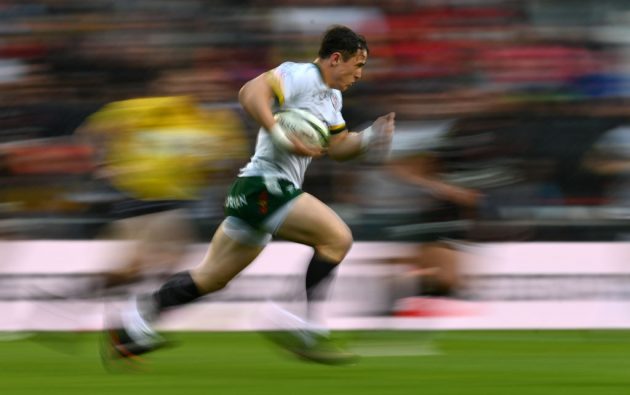Paul Williams reflects on rugby stars old and new, from Henry Arundell to Johnny Sexton
Henry Arundell’s ridiculous skills
It’s very easy to jump on an English winger’s bandwagon. Those bandwagons come through regularly with incredible speed and a sidestep than an actual bandwagon could only dream of – the axles simply wouldn’t flex. But it’s difficult not to lunge two-footed onto Henry Arundell’s bandwagon.
HENRY ARUNDELL, THAT IS UNREAL! ?
You won't see a better solo try than this for a very, very long time.
If you hadn’t noticed the youngster before, you certainly will do now ?#ChallengeCupRugby pic.twitter.com/KV86sxRySf
— Rugby on BT Sport (@btsportrugby) May 8, 2022
His try against Toulon was ridiculous, almost freakish. Some of the things he did to those defenders are illegal under the Geneva Convention. To see a winger check inside and out, at that speed, almost looked like a ‘deepfake’ whereas what you were watching were very real, deep, massive quad muscles generating enough torque to power a small motorcycle.
He’s been included in England’s wider training squad and rightly so. But whether Eddie Jones will have him pull on a shirt or pull tackle bags from the storage room remains to be seen.

Henry Arundell in action during England training (Getty Images)
La Rochelle shut down Leinster
Other than Moana Pasifika beating the Brumbies, La Rochelle’s victory in the European Champions Cup final over Leinster was the shock of the month.
No one gave La Rochelle a chance. And it was easy to see why. Leinster, even after the final, are top of the Champions Cup stats in all but four categories. They’re top for tries, points, carries, clean breaks, conversions, defenders beaten, metres gained and tackles made. That’s about as comprehensive as it gets. And over a whole season those stats are incredibly important. But in a one-off game, as La Rochelle proved, they’re meaningless.
La Rochelle’s defensive work was industrial. Their pack dominated the tackle-line and slowed down Leinster’s ball to the speed of a Conservative party leadership challenge. On an individual level, Jonathan Danty’s defensive impact was incredible, constantly jamming in midfield and turning the Leinster loop into a knot.
But it was perhaps in attack where the biggest change was so obvious. La Rochelle’s back-line passed the ball to the touchline with a speed and consistency that you rarely see in a final. Even if the quality of the pass was poor and the ball bounced three times before it got to the wing, the message was very clear – Leinster’s defensive line must be stretched at all costs. And it worked.
What a fantastic final and result for the club game in Europe.
Will Skelton dominates the final
How can one man, whose surname sounds so much like a rack of fleshless bones, be the complete opposite. His performance against Leinster in the Champions Cup final was as perfect as you’ll see from a forward and he dominated in everything he did.
Whether it was carrying or clearing, the sheer force of his impacts was something that Leinster hadn’t met all season and the need to double, even triple tackle him, created gaps in the narrow defence for La Rochelle’s other monsters to pile straight into.

La Rochelle’s Will Skelton takes on Leinster (AFP/Getty Images)
If he had performed like that for 60 minutes, it would still have been one of the individual performances of the season. To do it for 80 minutes was remarkable. Doing anything for 80 minutes is hard when you’re 6ft 8in tall and 22st in weight – just standing in the shower for over an hour would be draining at that size. To put in the performance that he did was genuinely on another level.
Every game is an advert for season tickets
There are no dead rubbers in rugby – even at the end of the season. Even without relegation, every game matters. And it matters for one reason: in rugby, your performances are the most important piece of your marketing and advertising strategy. Something that both Cardiff and Bath’s players seemed to have forgotten at various points towards the end of the season.
You can have props playing carpool karaoke on Facebook, you can have your backs cutting each other’s hair on Instagram and you can have your back row doing the water bottle challenge on horseback on Twitter. But nothing shifts season tickets like wins.
As the season winds down for players, it ramps up for the sales and marketing teams, and if you ship nearly 70 points away to Benetton, you may as well be selling cryotherapy gift vouchers on the Antarctic Plateau. Benetton, on the other hand, will probably have had to add another page to the sales spreadsheet.
Marketing rugby in the current climate is a tricky gig, especially when the energy crisis means that it costs about £4 to heat up a small tin of beans. Every game matters.
Johnny Sexton went nowhere
When will we learn not to prematurely retire players from their Test careers before they’re done? When the Lions team was being selected last year, this column wasn’t alone in thinking that Sexton’s incredible career was coming to an end – Warren Gatland did too. But as this season, and May in particular, has proven, Sexton is still one of the marquee tens in Europe and is still the best in Ireland.
His performance against Toulouse was brilliant. His inside ball for James Lowe’s try was vintage Sexton and very much the type of play you’d expect from a dominant Test-level ten. But if that pass for Lowe’s try was as expected, his show-and-go line break for Josh van der Flier’s try was as unexpected as a British MP turning down a Jägerbomb during a Covid work meeting. His pace into the gap was reminiscent of a 25-year-old ten, not one who is about to turn 37.
The head coaches of Ireland and Leinster have always seemed reluctant to blood a new option at ten and now we know why. The loss in the final against La Rochelle will have obviously affected Sexton, but he is still the best in Ireland. Of that there is no doubt.
Rugby needs the World Cup in the USA
The USA has been rugby’s sleeping giant for almost as long as a giant would probably sleep for. But sometimes sleeping giants need a little kick up their massive asses to get them going and awarding them the Rugby World Cup, in 2031 and 2033, is exactly that.
The decision to give the USA the nod was met with rugby’s usual divide. On one side you have the progressives who want to expand what is a very small game on a big planet, and on the other those who want the whole game played in the back garden of the house in which Webb Ellis was born. That the event hasn’t been given to an established power like South Africa has gone down like damp charcoal on a braai, but rugby can’t really worry about its past.

Rugby’s past is largely fantastic and nothing will change that. Rugby’s future is not so clear. Every major decision in rugby’s history has been met with ferocious debate. But on the whole, rugby’s major changes have worked. Just look at France joining the home nations and the South Africans joining the United Rugby Championship. Neither were popular, until they proved they could work. The USA’s World Cups will be exactly the same.
Download the digital edition of Rugby World straight to your tablet or subscribe to the print edition to get the magazine delivered to your door.
Follow Rugby World on Facebook, Instagram and Twitter.






